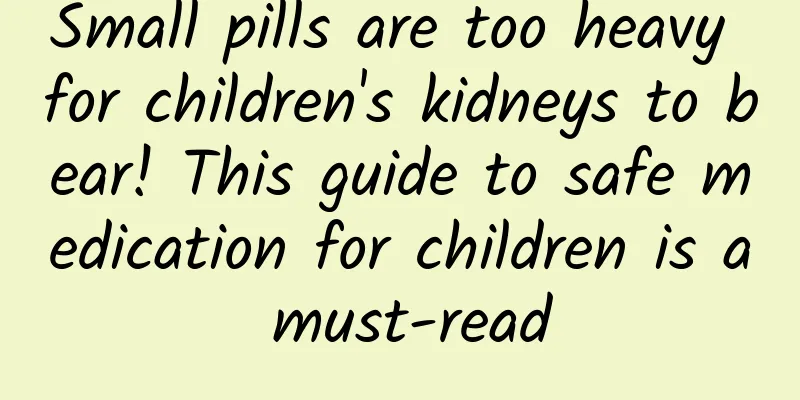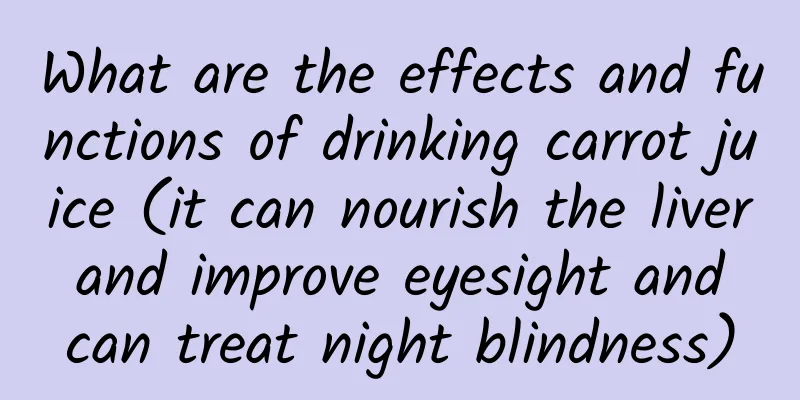Small pills are too heavy for children's kidneys to bear! This guide to safe medication for children is a must-read

|
Recently, the Pediatric Nephrology and Rheumatology Department of Hunan Provincial People's Hospital admitted a special child. The 8-year-old Tiantian suffered from atopic dermatitis. Her parents believed in folk remedies and took Chinese herbal decoctions containing Akebia for a long time. As a result, she developed anemia and hypertension, which led to severe kidney damage. She even needed dialysis treatment in the later stage. Colds, fevers, coughs, diarrhea, skin diseases, etc. are common in children as they grow up. Many parents will prescribe medicine on their own once their children are sick. However, some inadvertent incorrect use of medicine may cause damage to the children's kidneys. Children are at a critical stage of growth and development. Their body functions are not yet mature, their kidneys are more fragile than those of adults, they are more sensitive to drugs, and their metabolism and excretion abilities are relatively weak. Therefore, even common drugs, if used irrationally, may cause acute or chronic damage to children's kidneys, and some kidney damage may even be difficult to recover. Therefore, understanding how to use medications reasonably and prevent drug damage to children's kidneys is a compulsory course for every parent. 1. Common drugs that may cause kidney damage 1. Antipyretic and analgesic drugs: Nonsteroidal anti-inflammatory drugs such as acetaminophen (paracetamol) and ibuprofen are the most commonly used drugs for children to relieve fever and pain. However, excessive use of these drugs may cause nephrotoxicity and cause kidney damage. 2. Antibiotics: Certain antibiotics, such as gentamicin, cefuroxime, and cotrimoxazole, are very effective in treating infections, but if used for a long time or in excess, they may damage the renal tubules and cause interstitial nephritis; and some drugs, such as tetracycline, will produce structural mutations after expiration, and their renal toxicity will be significantly enhanced. 3. Some Chinese herbal medicines: Although Chinese medicines are considered relatively safe, some ingredients may have adverse effects on the kidneys. For example, some Chinese medicines containing aristolochic acid, such as Aristolochia strychnifolia and Stephania tetrandra, are highly nephrotoxic and carcinogenic. Therefore, parents must consult a professional doctor when giving their children Chinese medicine. 2. How to avoid kidney damage caused by irrational use of drugs 1. Strictly follow the doctor's instructions: When prescribing medicine, the doctor will accurately calculate the appropriate dosage and course of treatment based on the child's age, weight, condition and other comprehensive factors. Parents should strictly follow the doctor's instructions to give their children medicine, and do not increase or decrease the dosage or change the medicine on their own. 2. Choose medicines carefully: Children's medicines should be given priority. These medicines are more suitable for children in terms of ingredients, dosage, taste and administration method, and are safer. Do not give children adult medicines casually. The dosage and ingredients of adult medicines are designed according to the adult body. If children take them, they may damage their kidneys due to problems such as excessive dosage. 3. Understand drug information: Before using any medicine, you must read the instructions carefully to understand the drug's indications, usage, dosage, precautions and other information. 4. Strengthen drug management: Keep drugs out of reach of children to prevent them from taking them by mistake. At the same time, clean the family medicine box regularly and dispose of expired or spoiled drugs in time. 5. Pay attention to the child's reaction: During the medication process, pay close attention to the child's physical condition. If the child has some abnormal symptoms during the medication process, such as decreased urine volume, change in urine color, edema, etc., be sure to take the child to the hospital for examination in time.
(Edited by Wx) |
<<: What is cognitive impairment? Will it develop into dementia?
Recommend
Is the chance of ectopic pregnancy high?
A woman's ability to get pregnant and have ch...
Can I eat peach gum, saponin and rice snow swallow during pregnancy?
Everyone who eats peach gum snow swallow hopes th...
The benefits of crawling exercise for women
Many diseases are related to people standing, so ...
Harm of pickled fish to pregnant women
Sauerkraut fish is a dish that many people like t...
What happens when you are pregnant?
Full-term pregnancy is 40 weeks, in other words, ...
How to build a trellis for growing cowpeas and how to prune cowpeas
Cowpea is the most common vegetable on the table....
What should pregnant women eat when they are weak and sweat a lot?
In fact, many women will experience physical weak...
What should women eat to fight against aging? 15 types recommended by experts!
What women in today's society fear most is ag...
Frequent urination in women
Frequent urination is very common in daily life, ...
Can I eat chickpeas during my period?
Have you heard of chickpeas? Chickpeas are actual...
What causes endometrial thickening?
Endometrial thickening is a disease that is more ...
Can I keep the baby after two months of pregnancy?
Natural childbirth is the method of delivery that...
How many days can an ectopic pregnancy be detected?
What is ectopic pregnancy? Ectopic pregnancy, als...
What to do if pregnant women have high fasting blood sugar
A person's blood sugar level is constantly ch...
What supplements should women take for low blood sugar
In real life, many female friends will feel tired...









